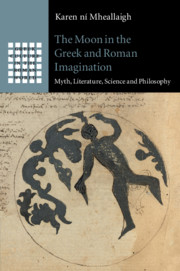Book contents
- The Moon in the Greek and Roman Imagination
- Greek Culture in the Roman World
- The Moon in the Greek and Roman Imagination
- Copyright page
- Dedication
- Contents
- Acknowledgements
- Abbreviations, Text References and Translations
- Part I The Moon in the Mythic Imagination
- Part II The Moon in the Scientific Imagination
- Part III The Moon in the Fantastic Imagination
- Chapter 5 The Imaginary Moon
- Chapter 6 Selēnoskopia
- Envoi
- Bibliography
- Index
- Index Locorum
Chapter 5 - The Imaginary Moon
Lunar Journeys
from Part III - The Moon in the Fantastic Imagination
Published online by Cambridge University Press: 09 October 2020
- The Moon in the Greek and Roman Imagination
- Greek Culture in the Roman World
- The Moon in the Greek and Roman Imagination
- Copyright page
- Dedication
- Contents
- Acknowledgements
- Abbreviations, Text References and Translations
- Part I The Moon in the Mythic Imagination
- Part II The Moon in the Scientific Imagination
- Part III The Moon in the Fantastic Imagination
- Chapter 5 The Imaginary Moon
- Chapter 6 Selēnoskopia
- Envoi
- Bibliography
- Index
- Index Locorum
Summary
As its title suggests, this chapter deals with ancient space-men: not in the sense of those early flights of fancy that took, for example, Peisetairos to Cloudcuckooland in Aristophanes’ comedy Birds, or Socrates’ imagination to the upper world where he could view the Earth as a globe in Plato’s Phaedo, though these are important predecessors (and we shall encounter them more fully in Chapter 6). I am dealing here with the motif of travel to the Moon. Among ancient writers of fictions of outer space, the best known today is probably Lucian of Samosata, who treats the Moon in two works, Icaromenippus and the rather better-known True Stories. As we shall see here, he may not in fact have been the first to put men on the Moon, but his lunar expeditions are the earliest that survive in detail. I come to Lucian last, not only because he is the latest, chronologically, of the authors I will treat here, but because his work is also the most complex, engaging with the entire preceding selenographical tradition in surprising and sophisticated ways, as well as with complex literary-critical matters in his own society. Two other lunar fantasies must be considered before we come to Lucian, both of them from fragmentary sources: Varro’s enigmatic Endymiones and Antonius Diogenes’ novel The incredible things beyond Thule, the latter of which exerted its influence, I believe, on Lucian’s work. Though slender, the threads connecting the Moon with fiction and lies in the ancient imagination are already discernible in these fragmentary works, and Lucian would weave these into a lavish cloth.
- Type
- Chapter
- Information
- The Moon in the Greek and Roman ImaginationMyth, Literature, Science and Philosophy, pp. 205 - 260Publisher: Cambridge University PressPrint publication year: 2020

